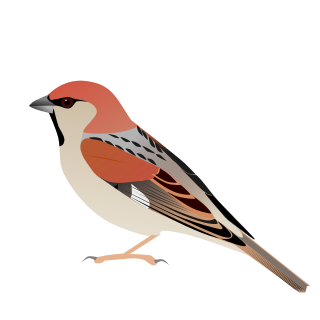
The Somali sparrow is a species of bird in the family Passeridae found in Somaliland, Djibouti, Ethiopia and Kenya.

Carabus auratus, the golden ground beetle, is a species of ground beetle in the genus Carabus. This species is native to central and western Europe and has been introduced into North America.
The shining thicket rat is a species of rodent in the family Muridae.
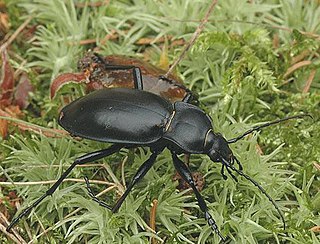
Carabus is a genus of beetles in family Carabidae. The genus is highly diverse with 94 subgenera, 897 species and 2300 subspecies, thus is the largest genus in the subfamily Carabinae. The vast majority are native to the Palearctic, but 11 Nearctic species are also known. Carabus spp. are 12–50 mm (0.47–1.97 in) long, and most species are wingless and often very colourful. These are nocturnal, predatory beetles that feed on snails, earthworms, and caterpillars. Most Carabus species were thought to have inhabited the Eurasian forest, but the species' low dispersal abilities altered the distribution of lineages within the genus.

Carabus olympiae is a species of beetle in family Carabidae, that can be found in France and Italy. It is considered to be vulnerable on the IUCN scale.

Carabus hortensis is a species of beetle in the Oreocarabus subgenus which can be found throughout Europe but is rarer in the extreme southwest. It is common in the Middle East.
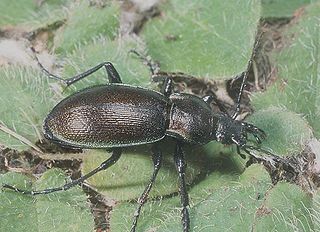
Carabus scheidleri is a species of beetle. It is endemic to Europe, where it is found in Austria, the Czech Republic, Germany, Hungary, Liechtenstein, Poland, Slovakia,.
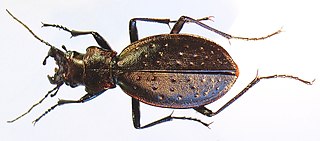
Carabus irregularis is a species of ground beetle endemic to Central Europe, Belgium, Italy, Luxembourg, Ukraine and all states of former Yugoslavia.

Carabus smaragdinus is a species of beetle belonging to the family Carabidae.
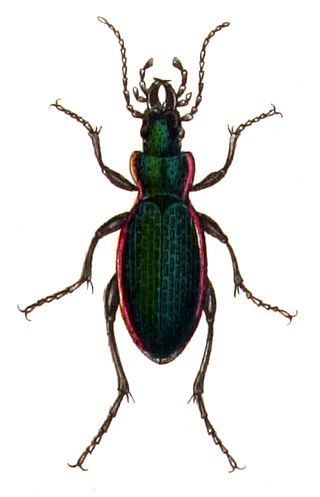
Carabus excellens is a species of beetle endemic to Europe, where it is observed in Belarus, Moldova, Poland, Romania, central and southern Russia, and Ukraine.

Carabus splendens is a species of beetle endemic to Europe, where it is observed in mainland France and mainland Spain.
Carabus dufouri is a species of black-coloured beetle from family Carabidae that are endemic to Spain. It is "one of the most representative species of the Carabus [genus] to the south of the Iberian Peninsula".

Carabus hummeli is a species of ground beetle in the subfamily Carabinae that can be found in Russia and the eastern Palearctic realm. The species are brown coloured with blue pronotum. They also can be found in such Asian countries as China, Mongolia, and North Korea.
Carabus lefebvrei is a species of bluish-black coloured ground beetle in the Carabinae subfamily, that is endemic to Sicily.

Carabus lusitanicus is a species of beetle from family Carabidae that is endemic to Iberia. It has a subspecies, Carabus lusitanicus breuningi.

Carabus pedemontanus is a species of beetle from family Carabidae, found in France and Italy.
Carabus planicollis is a species of black coloured ground beetle from Carabinae subfamily that is endemic to Romania.

Carabus sylvestris is a species of either black or brown-coloured ground beetle in the Carabinae subfamily that can be found in Austria, Czech Republic, Hungary, Italy, Liechtenstein, Poland, Romania, Slovakia, Slovenia, Ukraine, and the Netherlands.

Hapalopilus rutilans is a species of polypore fungus in the family Polyporaceae. Officially described in 1821, it was transferred to its current genus Hapalopilus six decades later. It is commonly known as the tender nesting polypore, purple dye polypore, or the cinnamon bracket. This widely distributed species is found on five continents. It grows on the fallen or standing dead wood of deciduous trees, in which it fruits singly, in groups, fused, or in overlapping clusters. Fruit bodies are in the form of kidney-shaped to semicircular, cinnamon-orange-brown brackets. The underside of the fruit body features a yellowish to brownish pore surface with tiny angular pores, from which spores are released.















